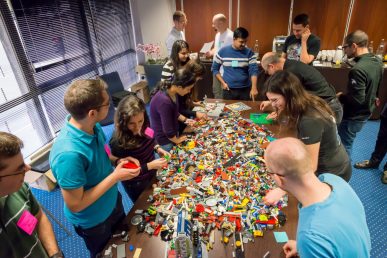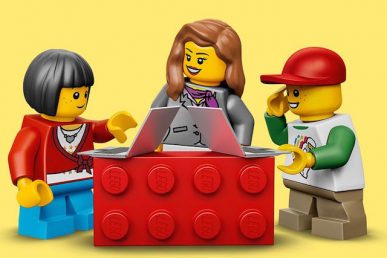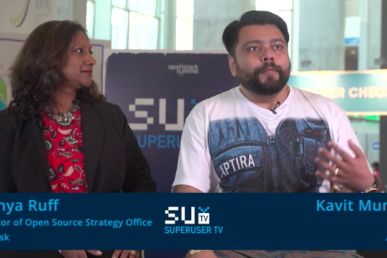Storytelling has been vital to passing on knowledge and gaining understanding of the world since we were living in caves. These days, speaking up around diversity and inclusion is a vital way to engage others in change.
At the recent Vancouver Summit, 12 percent of attendees identified as female and there were several events throughout the week to evangelize diversity within the community, including a pre-Summit social, a screening of documentary series “Chasing Grace” and a panel to discuss ways to mentor and grow the next generation of contributors.
Nithya Ruff, senior director of the open source practice at Comcast and an active participant in cross-community diversity initiatives, moderated a panel to discuss why inclusion is so important in open source and the tech industry as a whole.
Referring to the current landscape as “World 2.0,” Ruff explained how the industry is disrupting itself. “Even for how we do the most mundane tasks like booking a taxi, the world that makes [technology] should be diverse so we can reflect the diversity around us,” Ruff said.
Ruff also explained how inclusion also facilitates the reduction of bias, developer engagement and the overall sustainability of open source.
Ruff was joined by four panelists who shared personal anecdotes and advice for improving community inclusion and diversity.
- Bryan Johnson founded Black Boys Code, a nonprofit organization based in Vancouver that introduces boys of color age 8-17 to computer science through workshops, hackathons, after school and summer programs. When it comes to being more inclusive, Johnson recommends the simple task of looking at your LinkedIn profile. “How many people of color, how many women, how many transgender or gay individuals are in your network? That will give you an idea of how far you have to go in terms of inclusion,” he said. “It’s as simple as adding two new people to your LinkedIn network.”
- Joseph Sandoval who’s been in tech for a quarter century, realized 15 years ago there just weren’t enough women and people of color. “It’s critical now that we are actionable by connecting with mentors / mentees and helping people out of bootcamps. I want people to watch what I’m doing: You can have this if you want to work towards it. With more allies coming along, I know we can make change.”
- Amy Marrich chairs of the diversity Working Group in the OpenStack community, leads the Women of OpenStack and is a member of the OpenStack User Committee. “You can come into our community and be whoever you want to be.” Activities that Marrich leads onsite include speed mentoring where XX mentors and XX mentees attended as well as a Git & Gerrit Lunch & Learn that drew 35 attendees after receiving feedback that open source tools were a challenge for people whose first language was not English. “The more we can do to include people who are located somewhere else is invaluable.”
- Jennifer Cloer has been in tech for 17 years. Her current project is an example of how storytelling can change culture. She created the “Chasing Grace Project,” a six-episode documentary series about the industry challenges women face. Her first episode, which was screened at the Summit to a standing-room only crowd, discussed the pay gap.
Opening up about the pay gap
One tangible indicator of progress, the pay gap is the focus of “Chasing Grace’s” first episode. As a preview for the testimonials in the docuseries, Cloer shared stories of women she met who were inspired by the episode to negotiate equal pay to their male counterparts. One was a 17-year old girl with her eye on a computer science degree who was currently working at a yogurt shop. As a result of watching the episode, the girl spoke up to her boss and got a raise to match the wage of her male counterpart.
Bravo @jennifercloer for your brave and important work, “Chasing Grace.” The pay gap is real. And seriously messed up! Thank you #OpenStack Summit for showcasing this! pic.twitter.com/skHjCJuMlZ
— Lisa-Marie Namphy? (@SWDevAngel) May 22, 2018
“I’m encouraged because the narrative is starting to change; we are pivoting as an industry,” Cloer said. “But, it’s really early and it’s a marathon and not a sprint.”
Johnson echoed the importance of female inclusion by tapping into his own competitive spirit and desire to be number one.
“If you want to be number one, you have a whole nation where half the population is women who can rise your team to be number one,” he said. “If you really care about being the best you can be, you have this resource pool of brilliant individuals to advance your careers.”
Cloer also reminded the men in the room that all of us have a story and encouraged them to engage as a male ally, which resonated with a story that Sandoval shared around encouraging a coworker who had previously suffered in a toxic work culture.
By attending an event with his coworker and mentoring her through the following year’s event, he helped instill the confidence she needed to get internal stakeholders to pull an event sponsorship together. Now, she’s establishing herself as a leader at their organization and is well poised to reach C-suite level, says Sandoval.
Meaningful mentorship can be a 15-minute breakfast
While there are different degrees of mentorship, each of the panelists joined Sandoval in emphasizing how much difference a helping hand can make.
Marrich told the story of a man who leads the OpenStack User Group in South Africa who asked to meet for breakfast during the Barcelona Summit. He asked for advice on a local meetup he was organizing and she shared her training materials. Two months later, he followed up thanking Marrich and letting her know how well the material worked.
“It was a 15-minute conversation that changed not one life, but multiple lives of the people in attendance,” Marrich said.
Diversity takes many forms & is truly global. @CHAOSSproj is gathering multi inputs from across open source communities. @spotzz_ #OpenStackSummit pic.twitter.com/theH3cxDpI
— Nicole Huesman (@uoduckswtd) May 22, 2018
Sandoval related how his career was started by three women that helping him get into this industry. They looked at the inner person and championed, challenged him.
“In the context of open source, there is a bias,” he said. “Get the bias out of the way to get in the door to show your value. If you’re in a community, and you see someone trying to enter, try to remove the mystery behind it.”
Johnson also spoke about how Black Boys Code has created an academic environment where boys are not only learning, but excited about it. He told a story about one of the participants in the program whose mother found him still coding at 11:30 p.m.
“For me, the language is academic. It’s about getting the kids interested in coding,” he said. “Now, the school boards are contacting Black Boys Code.”
Making diversity initiatives mainstream
A member of the audience raised an important question at the end—with the increasing importance of diversity and inclusion, how we can get more people’s attention and action? Ruff put this question to the audience explaining that even at software conferences, the software and the products are only as successful as the diversity of people contributing.
“The health of a project or open source is not just measured by the maturity of the project or the number or pull requests,” she said. “It’s measured by the vibrancy and diversity of the community and how inclusive the community is.”
While there are ideas around how different events can incorporate more diversity conversations, the takeaway from this panel is to get involved and more importantly, tell your story.
To catch all the stories from the full 40-minute panel, watch the Vancouver Summit video below.
Have your own story to share? Contact editorATopenstack.org or submit it to the Berlin Summit call for presentations, deadline July 17.
- OpenStack Zed: The End of the Alphabet, The Beginning of a New Era | OpenInfra Live Recap - October 6, 2022
- Around the World with OpenInfra Events | OpenInfra Live Recap - September 22, 2022
- Making VDI a first-class citizen in the OpenStack world | OpenInfra Live Recap - August 25, 2022

)










